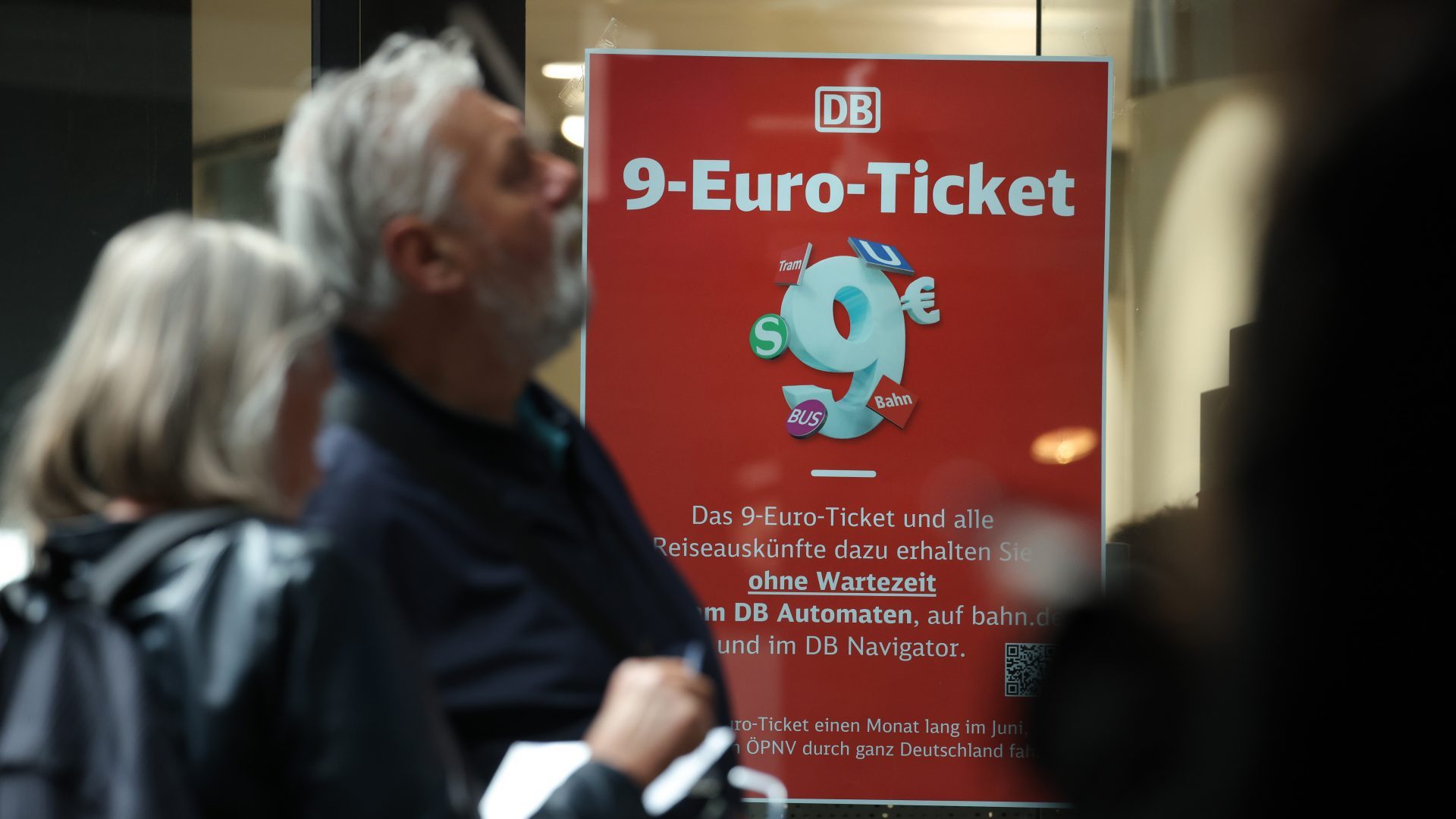I’ve just come back from 10 days in Germany. The €9 travel ticket, as mentioned by Tanit Koch (Germansplaining, TNE #296) was brilliant. Trips down to Einbeck and Göttingen. Trains not bursting at the seams, on time, and pretty comfortable in comparison to UK rolling stock. What Deutsche Bahn are losing on ticket sales is being spent in the local economies of the destinations. Also, some of my German friends are now commuting to work and abandoning the car. It seems to be having a positive impact.
Shaun Worrall
The €9 travel ticket is the worst thing that could have happened to Germany’s regular train commuters (who have partly abandoned the trains now and gone back to driving by themselves). It has shown the flaws and the limitations of German public transport, especially the local trains.
There have been a lot of cases where the federal police had to stop and empty trains and stations, since Germans don’t get the fact that it is stupid to take your bike with you when the train is already full. Nothing to admire here.
Alasdair Farquhar
I love German trains, even the local ones. There was a similar scheme (not as cheap) about 25 years ago called the Wochenendticket. By purchasing this ticket you could travel from midnight on Friday till midnight on Sunday (48 hours) using regional trains.
As students, we travelled across the whole country and got to know lots of people on the way. Sometimes we only spent a few hours in the destination cities but it was well worth it!
Edit Weigl-Gibby
Tanit Koch’s column on the €9 travel ticket is up to her usual high standards. Yet TNE is a UK publication and Tanit describes Sylt as “the German East Hampton”. East Hampton is in New York State. Surely a UK location should have been possible?
Rodney Mantle
Striking out
I cannot agree with Paul Mason that “Fixing the sickness in our economy starts with backing these strikes” (TNE #296). While I abhor the idea of further staff cuts to the railways, which can only mean fewer manned stations, more litter and graffiti and a generally less safe environment for the travelling public, why is striking the only way to resolve the issue?
I am a self-employed tour guide. My colleagues, who rely on railways for travelling between jobs, and whose income has plummeted since 2019, have little sympathy for those who have been receiving the same regular payment for the past 36 months, even if that buys a few per cent fewer goods than in 2019. One colleague of mine, who has hardly worked in three years, has been forced to withdraw from a job on June 21 as she cannot now reach the meeting point.
Would it not be better if the rail unions asked their members to continue working, but not to check tickets or take any money for them, just throwing open the barriers at mainline stations? This would not hurt the ordinary traveller, but surely would bring the management around the table as soon as they became aware of the losses they were suffering.
Unfortunately, the invariable impact of transport strikes (such as the BR strike of 1955 and the London bus strike of 1958) is just to increase the use of the private car, resulting in line closures and service withdrawals, plus more pollution and road accidents. When riding several branch lines in France days after service had been resumed following a strike, it was noticeable that the train crew generally exceeded the number of passengers.
I would hate the UK to return to the mayhem of the late 1970s when one person’s pay rise inevitably resulted in their neighbour’s price rise – or the loss of their neighbour’s job. The self-employed, pensioners and small business owners don’t have the luxury of going on strike, but suffer when anyone else takes this action.
Robert Sissons
Paul Mason highlight some of the industries that are suffering skills shortages: HGV drivers, vets, care homes. But no mention of the railways, which might have explained why it is that the current wave of strikes we’re suffering is threatening to shut down the trains, both national and local. Are train drivers being poached by other operators? Has Brexit affected the recruitment of guards?
Are station staff struggling to put food on their families’ tables? Or is the RMT simply using its muscle to defend the indefensible: drivers whose jobs are becoming less skilled as their cabs are more and more automated, guards whose sole purpose is to open and close doors, station staff who cluster around the barriers, chatting?
Trade unions play a vital role in protecting workers’ rights genuinely under threat, but Mr Mason has picked the wrong week to tell us we should be supporting the strikers. The RMT gives the trade-union movement a bad name.
Roger Hughes
London N1C
Doomed!
Re: Your front cover showing Johnson, Rees-Mogg, Patel et al as Dad’s Army (TNE #296). Any comparison of this shower to the brave patriots of Walmington-on-Sea Home Guard is an insult. They were all honourable men who wanted the best for their country.
Mark Palmer
Via Facebook
Pain of exile
I write as the son of a Polish refugee who, after the second world war and having fought for the allies, found himself unable to return to his homeland. Had he done so, he would have been immediately arrested at the border and probably executed (or sent to a Russian labour camp, tantamount to a death sentence).
As national borders changed, his town was removed from Poland and was (forcibly) transferred to Ukraine. Hence I was deeply moved on reading “The refugee inside us” (TNE #296) by historian Andreas Kossert.
I don’t think most people really understand what being a refugee entails. Kossert’s article will certainly have enlightened many. Thank you to him and you at TNE for publishing such a deeply moving piece. It is a terrible thing to be made to leave one’s home, family and country. The UK – and its current government above all – desperately needs to ponder these matters.
SK
Glasgow, Scotland
Andreas Kossert’s article was absolutely brilliant. It brought a very rich perspective to the huge catastrophe which befalls people who suddenly have to flee, and become refugees.
Although mention was made of Palestine in the article, as if their displacement was in the past, data on Palestinian refugees is not included in the United Nations High Commissioner for Refugees’ figures as they come under United Nations Relief and Works Agency for Palestine Refugees in the Near East. Their displacement from their homes continues and is increasing.
It has increased under the present government of Israel; at the same time very many have been killed, like the hugely popular journalist Shireen Abu Akleh, a Palestinian national treasure. Palestinians make up the largest number of refugees internationally.
Roger Gordon
North Shields
Left bias
Re: Mandrake on Jeremy Corbyn’s visit to Paris (TNE #296).
To still describe as “hard left” Mélenchon, who has assembled a broad left/socialist/Green alliance, is insulting. To describe Corbyn as “failed” is disrespectful and inaccurate when you look at the facts – in 2017 he got more votes for Labour than Blair in 2017 but was failed by a hostile press, a disloyal entrenched faction within the PLP and above all by the lack of PR in the UK.
Worse still, you repeat the same old tripe about Corbyn being “antisemitic”, which is utterly without foundation. This ignores Corbyn’s lifelong devotion to tolerance and antiracism and the large number of Jewish people in his constituency who strongly refute this allegation.
Brigid Benson
On the nose?
My friends waved Grand Hotel Europa, the book that formed the basis for Charlie Connelly’s “A continent obsessed with looking back” (TNE #296) in front of me.
Then they went on a tour of the beautifully preserved towns and villages of the Dordogne region, came back and told me “it was nothing like in the book”.
Preserving a country’s heritage is not about nostalgia.
Marie Noëlle Hersant
Via Facebook
Mitch & maths
I enjoy Mitch Benn’s column (“No overhaul control”, TNE #296) but think he should stay away from comments on mathematics. He sets Liz Truss what he regards as an impossible challenge “coming up with a numerical value for minus one (heretofore a nonexistent theoretical number expressed as the letter i.)”
So where do we start with this? First, he must mean the “square root of minus one”. I will allow this as a simple typing mistake (though not one a mathematician would ever make.) Second, the number represented by the letter i is a number. It is neither theoretical nor nonexistent. Third, I have no idea what the word “heretofore” is supposed to mean in this context.
The number i has the property that its square is -1. If Mitch Benn thinks that does not exist that is because it is simply unfamiliar to him, rather like a child who is unfamiliar with negative numbers and needs to be told they exist. But I do not want to suggest that Mitch Benn is a child.
The Greeks had no belief in negative numbers. After negative numbers came fractions. The ancient Egyptians liked their fractions to have 1 in the numerator. The fraction 3/5 would have left them baffled. Then along came the square root of 2, which Pythagoras thought must be a fraction a/b, until someone proved to him it wasn’t. At which point, he gave up arithmetic and stuck to geometry. Pythagoras may not have been all that smart.
Nigel Derby
Mathematics teacher, CATS College, London
Band aid
Re: “Band on the run” (TNE #295). What great memories! In the early days of Wings, Paul McCartney was producing songs like a geyser.
Sorry, I know it’s off topic, but I was struck by the date. This tour took place not many months after the UK had joined the European Community (as it then was). You’d be hard pressed to do that tour now. Among many other things Brexit is ruining, it has made it very hard for young British bands to get out on the continental road.
Richard Hands
Via Facebook
I saw Wings in Copenhagen, July 1972. A gymnasium was the venue. It was my honeymoon in Scandinavia.
My husband dragged me up to the stage, lifted me up and I was barely inches from Paul’s face. He smiled at me and I nearly fainted. He was amazing. Brilliant!
Meryl Herwood Freundlich
Via Facebook
During the period mentioned in your article Macca turned up at York University looking for a venue to play – we set him up in a college dining room! Word got around the city that day and the place was packed out. Every window was opened so the crowds outdoors could hear for free!
David Neville
Via Facebook
Alien at No 10
I thoroughly enjoy the TV adaptation of John Wyndham’s 1957 book The Midwich Cuckoos that is currently screening. Am I alone in thinking that something is missing?
In the George Sanders movie adaption (Village of the Damned, 1960), the malevolent creatures from a distant galaxy bore a strong resemblance to Boris Johnson as a child. Given what we now know, surely this is a very important point?
Don Adamson



